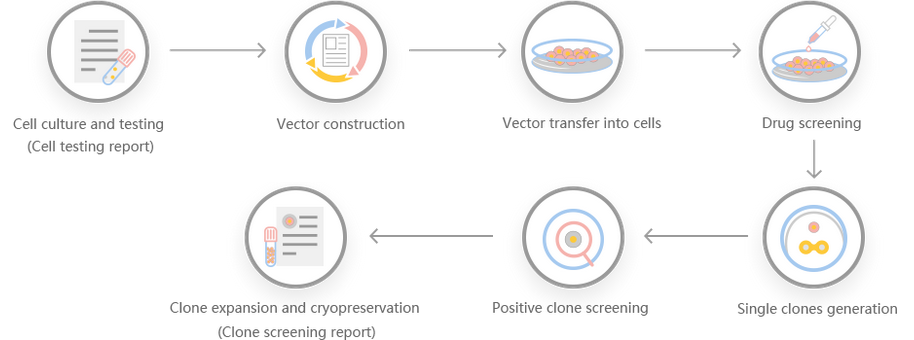CRISPR-U™ Gene Knockout Cell Line
Strategy
MXI1 Gene Knockout Strategy
CRISPR-U™ technology (CRISPR based), developed by Ubigene, is more efficient than general
CRISPR/Cas9 technology in double-strand breaking and homologous recombination. With CRISPR-U™, Ubigene has
successfully edited over 3000 genes on more than 100 types of cell lines.
Objective
To create a Human MXI1 Knockout
model in cell line by
CRISPR-U™-mediated
genome
engineering.
Target gene info 
| Official symbol | MXI1 |
| Gene id | 4601 |
| Organism | Homo sapiens |
| Official full symbol | MAX interactor 1, dimerization protein |
| Gene type | protein-coding |
| Also known as | MAD2, MXD2, MXI, bHLHc11 |
| Summary | Expression of the c-myc gene, which produces an oncogenic transcription factor, is tightly regulated in normal cells but is frequently deregulated in human cancers. The protein encoded by this gene is a transcriptional repressor thought to negatively regulate MYC function, and is therefore a potential tumor suppressor. This protein inhibits the transcriptional activity of MYC by competing for MAX, another basic helix-loop-helix protein that binds to MYC and is required for its function. Defects in this gene are frequently found in patients with prostate tumors. Three alternatively spliced transcripts encoding different isoforms have been described. Additional alternatively spliced transcripts may exist but the products of these transcripts have not been verified experimentally. |
| Genomic regions | Chromosome 10 |
Strategy Summary
This gene has 26 protein coding transcripts:
| Name | Transcript ID | bp | Protein | Biotype | CCDS | UniProt Match | RefSeq Match | Flags |
| MXI1-202 | ENST00000332674.9 | 3470 | 295aa | Protein coding | CCDS7563 | P50539-3 | NM_130439.3 | TSL:1, GENCODE basic, MANE Select v0.92, |
| MXI1-201 | ENST00000239007.11 | 2424 | 228aa | Protein coding | CCDS7564 | P50539-1 | - | TSL:1, GENCODE basic, APPRIS P1, |
| MXI1-203 | ENST00000361248.8 | 2188 | 182aa | Protein coding | CCDS31284 | P50539-4 | - | TSL:1, GENCODE basic, |
| MXI1-237 | ENST00000652604.1 | 2095 | 182aa | Protein coding | CCDS31284 | P50539-4 | - | GENCODE basic, |
| MXI1-218 | ENST00000651004.1 | 2995 | 192aa | Protein coding | - | P50539-2 | - | GENCODE basic, |
| MXI1-214 | ENST00000650810.1 | 2303 | 192aa | Protein coding | - | P50539-2 | - | GENCODE basic, |
| MXI1-215 | ENST00000650843.1 | 2255 | 192aa | Protein coding | - | P50539-2 | - | GENCODE basic, |
| MXI1-235 | ENST00000652463.1 | 2237 | 192aa | Protein coding | - | P50539-2 | - | GENCODE basic, |
| MXI1-229 | ENST00000651811.1 | 2230 | 192aa | Protein coding | - | P50539-2 | - | GENCODE basic, |
| MXI1-230 | ENST00000651848.1 | 2216 | 192aa | Protein coding | - | P50539-2 | - | GENCODE basic, |
| MXI1-212 | ENST00000650696.1 | 2150 | 192aa | Protein coding | - | P50539-2 | - | GENCODE basic, |
| MXI1-228 | ENST00000651613.1 | 2144 | 192aa | Protein coding | - | P50539-2 | - | GENCODE basic, |
| MXI1-220 | ENST00000651112.1 | 2140 | 116aa | Protein coding | - | A0A494C1C1 | - | CDS 5' incomplete, |
| MXI1-221 | ENST00000651167.1 | 2140 | 192aa | Protein coding | - | P50539-2 | - | GENCODE basic, |
| MXI1-231 | ENST00000651866.1 | 2129 | 192aa | Protein coding | - | P50539-2 | - | GENCODE basic, |
| MXI1-224 | ENST00000651467.1 | 2128 | 192aa | Protein coding | - | P50539-2 | - | GENCODE basic, |
| MXI1-236 | ENST00000652506.1 | 2127 | 192aa | Protein coding | - | P50539-2 | - | GENCODE basic, |
| MXI1-232 | ENST00000652028.1 | 2126 | 192aa | Protein coding | - | P50539-2 | - | GENCODE basic, |
| MXI1-211 | ENST00000650644.1 | 2121 | 192aa | Protein coding | - | P50539-2 | - | GENCODE basic, |
| MXI1-225 | ENST00000651495.1 | 1908 | 192aa | Protein coding | - | P50539-2 | - | GENCODE basic, |
| MXI1-217 | ENST00000650952.1 | 996 | 192aa | Protein coding | - | P50539-2 | - | GENCODE basic, |
| MXI1-205 | ENST00000393134.5 | 889 | 218aa | Protein coding | - | B1ANN8 | - | TSL:2, GENCODE basic, |
| MXI1-204 | ENST00000369612.1 | 879 | 192aa | Protein coding | - | P50539-2 | - | TSL:3, GENCODE basic, |
| MXI1-207 | ENST00000453116.5 | 803 | 226aa | Protein coding | - | F6U3F6 | - | CDS 3' incomplete, TSL:5, |
| MXI1-226 | ENST00000651516.1 | 664 | 192aa | Protein coding | - | P50539-2 | - | GENCODE basic, |
| MXI1-206 | ENST00000442296.5 | 634 | 118aa | Protein coding | - | F6WCI9 | - | CDS 3' incomplete, TSL:5, |
| MXI1-234 | ENST00000652323.1 | 2755 | 67aa | Nonsense mediated decay | - | A0A494C0W2 | - | - |
| MXI1-222 | ENST00000651225.1 | 2409 | 37aa | Nonsense mediated decay | - | A0A494C1P8 | - | - |
| MXI1-223 | ENST00000651318.1 | 2377 | 49aa | Nonsense mediated decay | - | A0A494BZS3 | - | - |
| MXI1-233 | ENST00000652243.1 | 2284 | 49aa | Nonsense mediated decay | - | A0A494BZS3 | - | - |
| MXI1-238 | ENST00000652649.1 | 2256 | 37aa | Nonsense mediated decay | - | A0A494C1P8 | - | - |
| MXI1-216 | ENST00000650900.1 | 1651 | 192aa | Nonsense mediated decay | - | P50539-2 | - | - |
| MXI1-219 | ENST00000651109.1 | 916 | 49aa | Nonsense mediated decay | - | A0A494BZS3 | - | - |
| MXI1-209 | ENST00000484030.5 | 838 | 67aa | Nonsense mediated decay | - | A0A494C0W2 | - | TSL:5, |
| MXI1-208 | ENST00000460667.5 | 782 | 79aa | Nonsense mediated decay | - | A0A494C0I8 | - | TSL:3, |
| MXI1-213 | ENST00000650752.1 | 732 | 49aa | Nonsense mediated decay | - | A0A494BZS3 | - | - |
| MXI1-227 | ENST00000651557.1 | 567 | 43aa | Nonsense mediated decay | - | A0A0S2Z429 | - | - |
| MXI1-210 | ENST00000485566.2 | 2444 | No protein | Processed transcript | - | - | - | TSL:1, |




Strategy
Click to get 
Red Cotton™ Assessment
Project Difficulty Level unknown
| Target Gene | MXI1 |
| This KO Strategy | loading |
| Red Cotton™ Notes | Gene MXI1 had been KO in hela cell line. |
Aforementioned information comes from Ubigene database. Different origin of cell lines may have
different condition. Ubigene reserved all the right for final explanation.
Special deals for this gene:
$49
Single gRNA plasmid off-shelf
$599
Single gRNA lentivirus



Work flow






 Comment:
Comment: